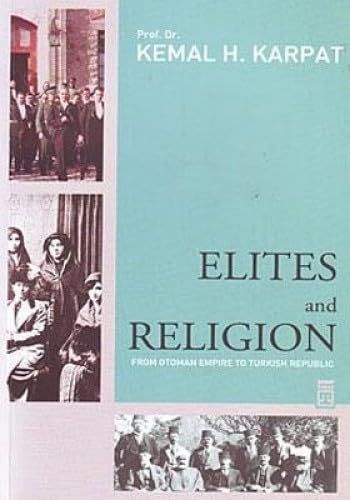Elites and Religion - Softcover

Zu dieser ISBN ist aktuell kein Angebot verfügbar.
Alle Exemplare der Ausgabe mit dieser ISBN anzeigen:Die Inhaltsangabe kann sich auf eine andere Ausgabe dieses Titels beziehen.
„Über diesen Titel“ kann sich auf eine andere Ausgabe dieses Titels beziehen.
- VerlagTimas Yayinlari
- Erscheinungsdatum2010
- ISBN 10 6051141227
- ISBN 13 9786051141220
- EinbandTapa blanda
- Anzahl der Seiten288
- Bewertung
Gebraucht kaufen
Zustand: Sehr gutPaperback. Demy 8vo. (21 x 14 cm... Mehr zu diesem Angebot erfahren
Versand:
EUR 18,00
Von Türkei nach USA
Beste Suchergebnisse beim ZVAB
Elites and religion from Ottoman Empire to Turkish Republic.
Buchbeschreibung Soft cover. Zustand: Fine. Paperback. Demy 8vo. (21 x 14 cm). In English. 282 p. "Professor Karpat, one of the most prominent names in the field of Political History, explores the social structure of Ottoman Empire through different eras and looks at Turkey's multi-party democracy culture from a historical perspective. His articles interpret the Ottoman history for broader audience and lay a vivid picture of events of recent history in front of our eyes. Professor Karpat's remarkable articles take us back to 18th century Ottoman days and examine change and modernization on those days, his work also looks into the independence and interaction of various social groups within a muslim state. The Ottoman social structure produced a unique way of practicing "secularism" where spiritual issues regarding faith and administrative issues regarding everyday state politics were kept completely independent from each other; one was dealing with earthly matters of day to day life of subjects of the Ottoman sultan, the other was to aid the followers of specific faith in their practice of religion and to prepare for after-life. Ottomans, despite having a highly complex social structure accommodating a number of ethnic groups and various religious orders, had successfully sustained freedom of faith by adopting the 'millet' system. Every non-muslim community represented by its leader was regarded as a 'millet' and enjoyed an absolute autonomy and freedom within its own faith and community in terms of practice of religion, language, social relations. During the Tanzimat era a new generation of religious leaders; who were relatively free from state regulations emerged among Ulema and unlike their predecessors they were not dignitaries. The social status of this newly emerging group from within well- established Ulema which was preoccupied at times to legitimise social and political change from an Islamic perspective or at other times tried to maintain status-quo siding with government, overlapped with the social image of the Ottoman middle-class. The fact that the new generation Ulema had common characteristics with ordinary middle-class people had a profound impact on Ottoman-Turkish political history. Consequently, the road map of 'modernity and secularism' set in Republican Turkey was identified by both the state represented by military and civilian bureaucrats and by people represented by local notables.". Artikel-Nr. 051962
Weitere Informationen zu diesem Verkäufer | Verkäufer kontaktieren

